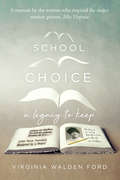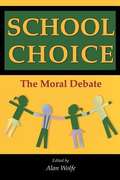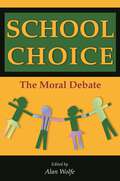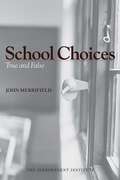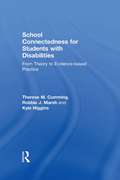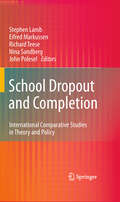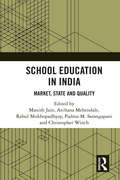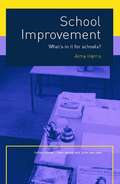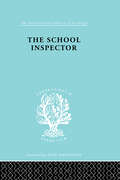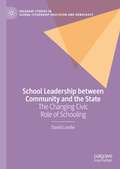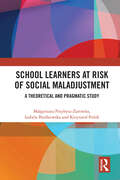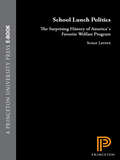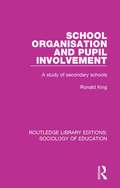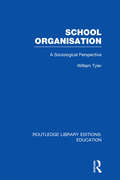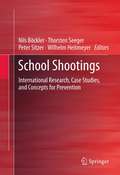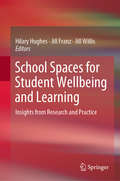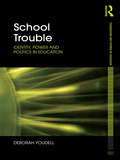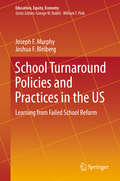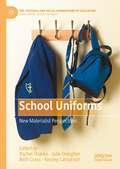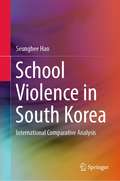- Table View
- List View
School Choice: A Legacy to Keep
by Virginia Walden FordOn a cold winter night in February of 1967, a large rock shattered a bedroom window in Virginia Walden Ford's home in Little Rock, Arkansas, landing in her baby sister's crib. Outside, members of the Ku Klux Klan burned a cross on her family's lawn. Faceless bigots were terrorizing Virginia, her parents, and her sisters–all because her father, Harry Fowler, dared to take a job as the assistant superintendent of personnel for the Little Rock School District. He was more than qualified, but he was black.In her searing new memoir, legendary school choice advocate Virginia Walden Ford recounts the lessons she learned as a child in the segregated south. She drew on those experiences—and the legacies handed to her by her parents and ancestors—thirty years later, when she built an army of parents to fight for school choice in our nation's capital. School Choice: A Legacy to Keep, tells the dramatic true story of how poor D.C. parents, with the support of unlikely allies, faced off against some of America's most prominent politicians—and won a better future for children.
School Choice: The Moral Debate
by Alan WolfeSchool choice has lately risen to the top of the list of potential solutions to America's educational problems, particularly for the poor and the most disadvantaged members of society. Indeed, in the last few years several states have held referendums on the use of vouchers in private and parochial schools, and more recently, the Supreme Court reviewed the constitutionality of a scholarship program that uses vouchers issued to parents. While there has been much debate over the empirical and methodological aspects of school choice policies, discussions related to the effects such policies may have on the nation's moral economy and civil society have been few and far between. School Choice, a collection of essays by leading philosophers, historians, legal scholars, and theologians, redresses this situation by addressing the moral and normative side of school choice. The twelve essays, commissioned for a conference on school choice that took place at Boston College in 2001, are organized into four sections that consider the relationship of school choice to equality, moral pluralism, institutional ecology, and constitutionality. Each section consists of three essays followed by a critical response. The contributors are Patrick McKinley Brennan, Charles L. Glenn, Amy Gutmann, David Hollenbach, S. J., Meira Levinson, Sanford Levinson, Stephen Macedo, John T. McGreevy, Martha Minow, Richard J. Mouw, Joseph O'Keefe, S. J., Michael J. Perry, Nancy L. Rosenblum, Rosemary C. Salomone, Joseph P. Viteritti, Paul J. Weithman, and Alan Wolfe.
School Choice: The Moral Debate
by Alan WolfeSchool choice has lately risen to the top of the list of potential solutions to America's educational problems, particularly for the poor and the most disadvantaged members of society. Indeed, in the last few years several states have held referendums on the use of vouchers in private and parochial schools, and more recently, the Supreme Court reviewed the constitutionality of a scholarship program that uses vouchers issued to parents. While there has been much debate over the empirical and methodological aspects of school choice policies, discussions related to the effects such policies may have on the nation's moral economy and civil society have been few and far between. School Choice, a collection of essays by leading philosophers, historians, legal scholars, and theologians, redresses this situation by addressing the moral and normative side of school choice. The twelve essays, commissioned for a conference on school choice that took place at Boston College in 2001, are organized into four sections that consider the relationship of school choice to equality, moral pluralism, institutional ecology, and constitutionality. Each section consists of three essays followed by a critical response. The contributors are Patrick McKinley Brennan, Charles L. Glenn, Amy Gutmann, David Hollenbach, S. J., Meira Levinson, Sanford Levinson, Stephen Macedo, John T. McGreevy, Martha Minow, Richard J. Mouw, Joseph O'Keefe, S. J., Michael J. Perry, Nancy L. Rosenblum, Rosemary C. Salomone, Joseph P. Viteritti, Paul J. Weithman, and Alan Wolfe.
School Choices: True and False
by John MerrifieldThe school choice movement has gained political momentum in recent years, with programs having been established in Milwaukee, Florida, Texas, and elsewhere. But today&’s programs are nothing like the "free market in education" proposed four decades ago by the early proponents of school choice.Economist John Merrifield shows that the "school choice" movement has become mired in false alternatives, petty distinctions, and diminished vision. Yet, he argues that programs providing real educational choices must not be allowed to fail like so many government programs—a freely competitive market for education must remain the ultimate goal. School Choices: True and False charts a course for the achievement of this goal.
School Connectedness for Students with Disabilities: From Theory to Evidence-based Practice
by Kyle Higgins Therese M. Cumming Robbie J. MarshSchool Connectedness for Students with Disabilities: From Theory to Evidence-based Practice focuses on the importance of school connectedness for students with disabilities, and presents ways in which this sense of connectedness can be fostered. Written from a holistic perspective, it embraces a variety of approaches, strategies and interventions rooted in evidence-based theory and practice, and examines them not only in regard to the student with a disability, but also school leaders, teachers, families and community members. The book describes and defines the concept of school connectedness, provides the reader with a theoretical framework from which to examine connectedness and explores connectedness from the lens of each of its components. It discusses the importance of assessing school connectedness in order to make data-based intervention decisions, as well as unpacking the components of student engagement, school climate, bonding and attachment. Several school-wide and leadership approaches that foster school connectedness are presented, as are ways to involve families. All of these are discussed through the lens of disability, in order to acknowledge the characteristics of disability that affect student levels of school connectedness.School connectedness has become a priority for many schools and educators internationally. Research demonstrates the importance of connectedness as a protective factor, and its impact on the health behaviour, social, emotional and academic outcomes of young people. Grounded in theory and relevant to practice, this is essential reading for anyone interested in improving the school connectedness of students with different disabilities across the lifespan.
School Dropout and Completion
by Stephen Lamb Richard Teese John Polesel Eifred Markussen Nina SandbergSchool dropout remains a persistent and critical issue in many school systems, so much so that it is sometimes referred to as a crisis. Populations across the globe have come to depend on success at school for establishing careers and gaining access to post-school qualifications. Yet large numbers of young people are excluded from the advantages that successful completion of school brings and as a result are subjected to consequences such as higher likelihood of unemployment, lower earnings, greater dependence on welfare and poorer physical health and well-being. Over recent decades, most western nations have stepped up their efforts to reduce drop out and raise school completion rates while maintaining high standards. How school systems have approached this, and how successful they are, varies. This book compares the various approaches by evaluating their impact on rates of dropout and completion. Case studies of national systems are used to highlight the different approaches including institutional arrangements and the various alternative secondary school programs and their outcomes. The evaluation is based on several key questions: What are the main approaches? How do they work? For whom do they work? And, how successful are they in promoting high rates of completion and equivalent outcomes for all? This book examines the nature of the dropout problem in advanced industrialized countries with the goal of developing a broader, international understanding that can feed into public policy to help improve completion rates worldwide.
School Education in India: Market, State and Quality
by Christopher Winch Manish Jain Archana Mehendale Rahul Mukhopadhyay Padma M. SarangapaniThis volume examines how the public and private domains in school education in India are informed and mediated by current market realities. It moves beyond the simplistic dichotomy of pro-state versus promarket factors that define most current debates in the formulations of educational reform agendas to underline how they need to be interpreted in the larger context. The chapters in the volume present a series of conceptual and empirical investigations to understand the growth of private schools in India; investigate the largely uncontested claims made by the private sector regarding provision of superior quality of education; and their ability to address the educational needs of the poor. Further, the book looks at how the private–public dichotomy has been extended to professional identity of teachers and teaching practices as well. <P><P>Rich in primary data and supported by detailed case studies, this volume will be of interest to teachers, scholars and researchers dealing with education, educational policy, school education and public policy. It will also interest policy makers, think tanks and civil society organisations.
School Experience: Explorations in the Sociology of Education (Routledge Library Editions: Sociology of Education #60)
by Martyn Hammersley Peter WoodsFirst published in 1977, this volume brings together a range of viewpoints, informed by reports of empirical research, which bear on the experience of school. Each chapter demonstrates the application of the ‘new sociology of education’ in its various guises to the world of teachers and pupils. In doing so, they exemplify the fields of investigation opened up by these theoretical developments, and also suggest directions ahead. The tensions in the articles reflect the tensions that existed in the sociology of education. By bringing them together, the aim of this volume is to contribute to a more soundly based sociology of education.
School Improvement: What's In It For Schools? (What's in it for schools?)
by Alma HarrisThis book aims to demystify the principles and practice of school improvement by demonstrating how successful classroom and school improvement occurs. It outlines the conditions, strategies and approaches that promote sustainable improvement and provides an overview of the main theoretical perspectives in this area. This accessible text will be useful for practitioners working within schools and with schools, offering clear guidance for those keen to raise standards and improve achievement. The What's In It For Schools? series aims to make educational policy issues relevant to practitioners. Each book in the series focuses on a major educational issue. The author sets the issue in context, looks at how it impacts on the daily lives of schools and teachers, and raises key questions. The books are grounded in sound theory, recent research evidence and best practice, and will make an excellent addition to any staffroom bookshelf.
School Inspector Ils 233 (International Library of Sociology)
by E.L. EdmondsFirst Published in 1998. Routledge is an imprint of Taylor & Francis, an informa company.
School Knowledge for the Masses: World Models and National Primary Curricular Categories in the Twentieth Century (Routledge Library Editions: Sociology of Education #36)
by John W. Meyer David Kamens Aaron BenavotFirst published in 1992, this book presents unique quantitative data on the content coverage of primary education in a large number of countries since 1920. It demonstrates that these curricular outlines tend to be surprisingly similar across very disparate countries, and suggests the world processes that produced this result. Specifically, the study shows that the contemporary primary curriculum dates from changes in the late nineteenth century; that there has been a general shift towards a ‘social studies’ subject; that instruction in mathematics and sciences has tended to expand; that there have been substantial increases in foreign language instruction (and changes in the languages taught); and that instruction in the arts and physical education come to the standard world education model much later than other subjects. This work will be of particular interest to those studying primary curriculum, international education and the sociology of education.
School Leadership and Administration: The Cultural Context (Reference Books in International Education)
by Allan Walker Clive DimmockThis text calls for a broader approach to comparative educational administration: one which uses culture as the principle means of analysis. The articles collected by Allan Walker and Clive Dimmock detail the educational practices and outcomes of other systems while taking into account the mediating influence of culture. In this way, these essays stress the specific aspects of the cultures studied, and map out common ground for the study of administrators' values, beliefs, and actions.
School Leadership between Community and the State: The Changing Civic Role of Schooling (Palgrave Studies in Global Citizenship Education and Democracy)
by David LundieThis book presents changes in UK and global educational governance in the context of a radical shift in the operating logics of politics and its interaction with education. Beginning from the colonial origins of political interest in education, the author traces a fundamental shift in the patterns of governance of schools in England in the opening decades of the 21st century. Operating through the logics of public choice economics involving both real markets and quasi-markets, policy reforms have increasingly framed school values, and the value of schooling, in line with a politically determined and nostalgic discourse of ‘British values’. This stands in contrast to a previous focus on ‘community cohesion’ which foregrounded school partnership with the parent community and wider society. Tracing the processes and mid-level actors mediating between government and school leaders, the author identifies processes of recontextualisation through which policy can be reinscribed and resisted.
School Learners at Risk of Social Maladjustment: A Theoretical and Pragmatic Study
by Małgorzata Przybysz-Zaremba Izabela Bieńkowska Krzysztof PolokThis book is a valuable didactic help (school teachers, guardians, and parents included) for those who wish to understand the specifics of education better and for students of pedagogical and psychological faculties who plan to work with young people in various educational institutions.This volume examines the problems and challenges of social maladjustment at school from a theoretical and practical perspective – it not only aims to present the latest scientific research on students at risk of social maladjustment (as well as those socially maladjusted) but also proposes strategies and methods of working with those a-ected by it. In nine chapters focusing on various aspects of social maladjustment in school, the authors use their professional and scientific experience to present practical tips and suggestions for teachers, therapists, and pedagogues suggesting preventive actions to counteract pathological phenomena in schools.This book will be useful for all those professionally involved in the fields of education, psychology, sociology, remote work, and/or studies on child and youth development. It could also be an invaluable companion to policy-makers and professionals from government and nongovernment organizations working towards inclusive education and social development. Additionally, it will serve as a compendium of guiding methods for problems encountered in professional work.
School Lunch Politics: The Surprising History of America's Favorite Welfare Program
by Susan LevineWhether kids love or hate the food served there, the American school lunchroom is the stage for one of the most popular yet flawed social welfare programs in our nation's history. School Lunch Politics covers this complex and fascinating part of American culture, from its origins in early twentieth-century nutrition science, through the establishment of the National School Lunch Program in 1946, to the transformation of school meals into a poverty program during the 1970s and 1980s. Susan Levine investigates the politics and culture of food; most specifically, who decides what American children should be eating, what policies develop from those decisions, and how these policies might be better implemented. Even now, the school lunch program remains problematic, a juggling act between modern beliefs about food, nutrition science, and public welfare. Levine points to the program menus' dependence on agricultural surplus commodities more than on children's nutritional needs, and she discusses the political policy barriers that have limited the number of children receiving meals and which children were served. But she also shows why the school lunch program has outlasted almost every other twentieth-century federal welfare initiative. In the midst of privatization, federal budget cuts, and suspect nutritional guidelines where even ketchup might be categorized as a vegetable, the program remains popular and feeds children who would otherwise go hungry. As politicians and the media talk about a national obesity epidemic, School Lunch Politics is a timely arrival to the food policy debates shaping American health, welfare, and equality.
School Organisation and Pupil Involvement: A study of secondary schools (Routledge Library Editions: Sociology of Education #31)
by Ronald KingFirst published in 1973, this book is based on research carried about by Ronald King on integral parts of school organisation, including the assembly, uniform, rewards and punishments, games and out-of-school activities, curriculum, prefectorial system and school councils, in a sample of seventy-two schools. It measures and explores the level of pupils’ involvement in the school, in terms in their evaluations and effective dispositions, in relation to pupil age, sex and social background. This book will be a valuable resource for those studying the sociology and history of education, as well as educational research and school organisation.
School Organisation: A Sociological Perspective (Routledge Library Editions: Education)
by William TylerThe internal organisation of the school touches on many areas of contemporary debate. Is there such a thing as a ‘good school’? Are large urban comprehensives necessarily impersonal? Are the charges of indiscipline, conflict and declining standards in modern schools based on a failure to understand schools as institutions? At the time this book was first published sociological analysis had neglected to consider schools as organisational entities, preferring to see them as either the sites for negotiated encounters between teachers and pupils or else as agencies of class reproduction. The author redresses this imbalance and by relating the various literatures on the school to the constitutive patterns of its internal organisation he demonstrates the need for a more intensive sociological study of this embattled institution.
School Rules
by Rebecca RabyHow much say should students have in shaping their schools' disciplinary cultures? Should they have the power to weigh in on contentious issues like favouritism, discrimination, 'no hats' rules, and zero tolerance? What if pupils disagree with their teachers and administrators on certain rules? Rebecca Raby reflects on how regulations are made, applied, and negotiated in educational settings in the accessibly written School Rules.Through an in-depth analysis of original data, including interviews with teachers, administrators, and students, and codes of conduct, School Rules reveals what rules mean to different participants, and where it is that they becoming a challenge. Raby investigates students' acceptance or contestation of disciplinary regulations, and examines how school rules reflect and perpetuate existing inequalities and students' beliefs about young people. Illustrating the practical challenges and political and theoretical concerns of involving students in rule-making, School Rules can help teachers and administrators facilitate more meaningful rules and student participation in their own schools.
School Segregation and Social Cohesion in Santiago: Perspectives from the Chilean Experience (International Study of City Youth Education #3)
by Andres MolinaThis book examines the consequences of educational segregation from the perspective of social cohesion. It investigates the impact of separating students along socioeconomic lines on student attitudes, dispositions and outlooks considered important for social cohesion as well as on achievement, opening the discussion about the social costs of school segregation. The separation of students based on their social background is a common feature of schooling in many modern systems. This is not only due to the influence of residential segregation but also to the effects of policies promoting educational privatisation, parental choice and student academic selection. By recognising the importance of schooling for citizenship and social integration, the chapters in this book explore how the separation of students throughout their school lives can contribute to the division of citizens beyond school, and how social segregation in school systems affect social cohesion more broadly.By exploring the case of Santiago, Chile, the study is a timely contribution to the understanding of the roots of social division and the role that schools play in creating cohesive societies. The originality of the approach and the evidence presented draw on implications that should be of interest to a wider audience concerned with contemporary discussions on solidarity and its erosion by educational segregation in urban environments.
School Shootings
by Wilhelm Heitmeyer Thorsten Seeger Peter Sitzer Nils BöcklerSchool shootings are a topic of research in a variety of different disciplines--from psychology, to sociology to criminology, pedagogy, and public health--each with their own set of theories. Many of these theories are logically interconnected, while some differ widely and seem incompatible with each other, leading to divergent results about potential means of prevention. In this innovative work, leading researchers on the topic of school shootings introduce their findings and theoretical concepts in one combined systematic volume. The contributions to this work highlight both the complementary findings from different fields, as well as cases where they diverge or contradict each other. The work is divided into four main sections: an overview of current theoretical approaches and empirical models; application of these theories to international cases, including Columbine (USA), Emsdetten (Germany), and Tuusula (Finland); a critique of the influence of the media, both in the portrayals of past events and its effect on future events; and finally an overview of existing models for prevention and intervention, and measures of their success. The result is a comprehensive source for current research on school shootings, and will provide a direction for future research.
School Spaces for Student Wellbeing and Learning: Insights from Research and Practice
by Hilary Hughes Jill Franz Jill WillisThis book introduces a new wellbeing dimension to the theory and practice of learning space design for early childhood and school contexts. It highlights vital, yet generally overlooked relationships between the learning environment and student learning and wellbeing, and reveals the potential of participatory, values-based design approaches to create learning spaces that respond to contemporary learners’ needs. Focusing on three main themes it explores conceptual understandings of learning spaces and wellbeing; students’ lived experience and needs of learning spaces; and the development of a new theory and its practical application to the design of learning spaces that enhance student wellbeing. It examines these complex and interwoven topics through various theoretical lenses and provides an extensive, current literature review that connects learning environment design and learner wellbeing in a wide range of educational settings from early years to secondary school. Offering transferable approaches and a new theoretical model of wellbeing as flourishing to support the design of innovative learning environments, this book is of interest to researchers, tertiary educators and students in the education and design fields, as well as school administrators and facility managers, teachers, architects and designers.
School Trouble: Identity, Power and Politics in Education (Foundations and Futures of Education)
by Deborah YoudellWhat is the trouble with schools and why should we want to make ‘school trouble’? Schooling is implicated in the making of educational and social exclusions and inequalities as well as the making of particular sorts of students and teachers. For this reason schools are important sites of counter- or radical- politics. In this book, Deborah Youdell brings together theories of counter-politics and radical traditions in education to make sense of the politics of daily life inside schools and explores a range of resources for thinking about and enacting political practices that make ‘school trouble’. The book offers a solid introduction to the much-debated issues of ‘intersectionality’ and the limits of identity politics and the relationship between schooling and the wider policy and political context. It pieces together a series of tools and tactics that might destabilize educational inequalities by unsettling the knowledges, meanings, practices, subjectivities and feelings that are normalized and privileged in the ‘business as usual’ of school life. Engaging with curriculum materials, teachers’ lesson plans and accounts of their pedagogy, and ethnographic observations of school practices, the book investigates a range of empirical examples of critical action in school, from overt political action pursued by educators to day-to-day pedagogic encounters between teachers and students. The book draws on the work of Michel Foucault, Judith Butler, Ernesto Laclau and Chantel Mouffe, and Gilles Deleuze and Felix Guattari to make sense of these practices and identify the political possibilities for educators who refuse to accept the everyday injustices and wide-reaching social inequalities that face us. School Trouble appears at a moment of political and economic flux and uncertainty, and when the policy moves that have promoted markets and private sector involvement in education around the globe have been subject to intense scrutiny and critique. Against this backdrop, renewed attention is being paid to the questions of how politics might be rejuvenated, how societies might be made fair, and what role education might have in pursing this. This book makes an important intervention into this terrain. By exploring a politics of discourse, an anti-identity politics, a politics of feeling, and a politics of becoming, it shows how the education assemblage can be unsettled and education can be re-imagined. The book will be of interest to advanced undergraduate and postgraduate students and scholars in the fields of education, sociology, cultural studies, and social and political science as well as to critical educators looking for new tools for thinking about their practice.
School Turnaround Policies and Practices in the US: Learning From Failed School Reform (Education, Equity, Economy Ser. #6)
by Joseph F. Murphy Joshua F. BleibergThis volume provides an analysis of what we know about turning around "failing" schools in the United States. It starts with an in-depth examination of the barriers that hinder action on turnaround work.The book analyses the reasons why some schools that find themselves in serious academic trouble fail in their efforts to turn themselves around. Beginning with a discussion of what may best be described as "lethal" reasons or the most powerful explanation for failed reform initiatives, which include an absence of attention to student care and support; a near absence of attention to curriculum and instruction; the firing of the wrong people. Covered in this volume are "critical" explanations for failed turnaround efforts such as failure to attend to issues of sustainability, and "significant" explanations for failed turnaround efforts such as the misuse of test data. The volume concludes by examining what can be done to overcome problems that cause failure for turnaround schools and reviewing ideas in the core technology of schooling: curriculum, instruction, and assessment. As well as exploring problems associated with the leadership and management of schools to see where improvement is possible and an analysis of opportunities found in relationships between schools and their external partners such as parents and community members.
School Uniforms: New Materialist Perspectives (The Cultural and Social Foundations of Education)
by Rachel Shanks Julie Ovington Beth Cross Ainsley CarnarvonThis edited volume brings together a new materialist approach to understanding the various legacies and controls being exercised through school uniforms. Through examining school uniform policies, the editors and their authors highlight the embodied choices that contribute to a socio-materialist understanding of democracy and social justice. Uniform policy plays a distinct role in setting the culture of compulsory school education and as such it constitutes a set of under-theorised school practices. This work thus brings together critical perspectives from education, sociology, cultural and postcolonial studies within an overarching analysis of how uniform imposes performances that have a formative effect on young people’s identities and economic positionality.
School Violence in South Korea: International Comparative Analysis
by Seunghee HanThis book examines school violence in South Korea from an international comparative perspective. It analyses nationally representative samples and provides extensive literature reviews based on academic journals, various social and educational magazines and major media articles on school violence in South Korea. This book includes major data sets for the analysis such as Trends in International Mathematics and Science Study and Nation Youth Policy Institute. These data show frequency, patterns and associated factors of school violence in South Korea and comparison of those in Japan and the United States.
